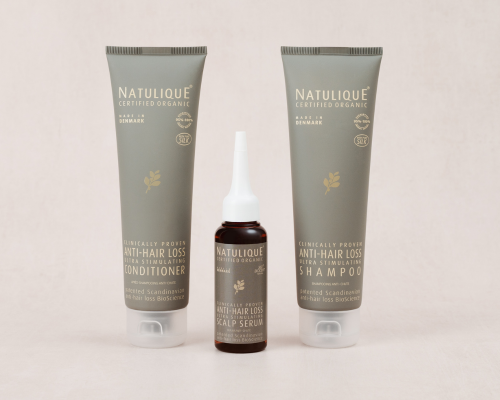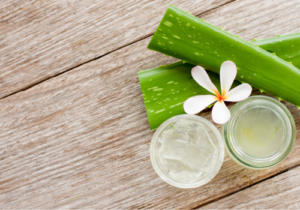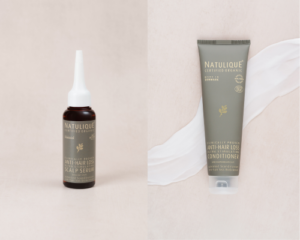After pregnancy, many women find themselves confronted with a common but often worrying phenomenon: postpartum hair loss. Pregnancy brings many hormonal changes, and the effects can persist long after delivery, affecting various aspects of a new mother's health, including her hair. Understanding how to strengthen hair after pregnancy is essential to helping new moms regain their self-confidence and promote healthy hair.
Understanding Postpartum Hair Loss
The science behind post-pregnancy hair loss
Postpartum hair loss, also known as telogen effluvium, is a temporary phenomenon that generally occurs between a few weeks and a few months after childbirth. During pregnancy, high estrogen levels prolong the anagen (growth) phase of the hair life cycle, meaning that less hair falls out. However, after childbirth, estrogen levels drop rapidly, causing many hairs to transition rapidly into the telogen (resting) phase, which ends with more abundant hair loss.
The role of hormones
Hormones play a crucial role in hair health. During pregnancy, high levels of estrogen and other hormones promote hair growth and thickening. After childbirth, these levels drop, causing a large number of hair follicles to enter the resting phase and eventually fall out after three to six months. This hair loss can be alarming, but it is completely normal and, above all, temporary.
Common calendar for postpartum hair loss
Hair loss can vary from one individual to another, but often begins between three and four months after delivery, peaking around the sixth month. For most women, the situation improves naturally, and they return to their normal hair growth routine within a year of giving birth.
Identifying the signs of postpartum hair loss
What is the normal amount of hair loss?
It's important to know that daily hair loss is normal. On average, a person loses between 50 and 100 hairs a day. However, in the postpartum period, women can lose up to 300 hairs a day, which can seem much more visible and intense. If hair loss exceeds this number or persists beyond 12 months, it may be wise to consult a health professional to rule out other underlying causes such as persistent hormonal problems or nutritional deficiencies.
When to contact a doctor
Although postpartum hair loss is generally harmless, there are times when consulting a doctor is necessary. If hair loss is accompanied by other symptoms such as profound fatigue, unexplained weight gain, or if there are light areas or raised patches, it's advisable to consult a dermatologist. A doctor can check hormone levels, prescribe an appropriate treatment, or suggest other solutions to support hair growth.
Tips for strengthening hair after pregnancy
Maintaining a healthy diet
A balanced diet is crucial to promote healthy, growing hair after pregnancy. Specific nutrients can play an important role in fortifying hair, ensuring that it remains strong and resilient.
Nutrients for hair growth
- Protein : Protein is essential for keratin, a main component of hair. Incorporating lean meats, eggs or lentils into your diet can help provide the necessary protein.
- Iron : Iron deficiency can exacerbate hair loss. Rich sources of iron include red meat, spinach and lentils.
- Vitamin D : It plays a crucial role in the creation of new hair follicles. Salmon, milk and exposure to the sun are good sources of vitamin D.
- Omega-3 : Omega-3 fatty acids promote hair shine and elasticity. Think oily fish like salmon and walnuts.
Recommended foods for healthy hair
- Oily fish (such as salmon and mackerel)
- Eggs for biotin and protein
- Berries rich in vitamin C
- Almonds for zinc and vitamin E
- Avocados for healthy oils and vitamin E
Adopting a proper hair care routine
Daily hair care is essential to maintain hair health and encourage growth after childbirth.
Suitable hair care products
- Opt for gentle, sulfate-free shampoos that don't strip hair of its natural oils.
- Use moisturizing conditioners to nourish hair.
- Apply natural oils such as coconut or argan oil to seal in moisture.
Best practices for hair treatments
- Avoid using excessive heat on your hair (hair dryers, straightening irons).
- Opt for loose hairstyles to avoid excessive pulling on the hair.
- Trim ends regularly to eliminate split ends and encourage healthy growth.
Importance of Stress Management
Stress can have a significant impact on hair health, often exacerbating hair loss.
The impact of stress on hair loss
Stress can cause a subsequent hormonal imbalance, creating an environment conducive to hair loss. Managing stress is therefore crucial.
Stress reduction techniques
- Practice relaxation activities such as yoga or meditation to calm the mind.
- Ensure sufficient sleep to allow the body to recover and manage hormonal levels.
- Engage in regular physical activity to release endorphins, helping to reduce stress.
Professional Consultation and Treatment
Sometimes, the intervention of a professional is necessary to effectively tackle postpartum hair loss.
When to consult a dermatologist
If hair loss persists beyond one year, or seems abnormally abundant, consulting a dermatologist may be beneficial. He or she may suggest tests to rule out other causes, such as hormonal imbalances.
Professional treatments available for hair loss
- Treatments such as Rogaine (minoxidil) couldSee also: How to limit stress-related hair loss?
Tips for strengthening hair after pregnancy
Maintaining a healthy diet
A balanced diet is crucial to promote healthy, growing hair after pregnancy. Specific nutrients can play an important role in fortifying hair, ensuring that it remains strong and resilient.
Nutrients for hair growth
- Protein : Protein is essential for keratin, a main component of hair. Incorporating lean meats, eggs or lentils into your diet can help provide the necessary protein.
- Iron : Iron deficiency can exacerbate hair loss. Rich sources of iron include red meat, spinach and lentils.
- Vitamin D : It plays a crucial role in the creation of new hair follicles. Salmon, milk and exposure to the sun are good sources of vitamin D.
- Omega-3 : Omega-3 fatty acids promote hair shine and elasticity. Think oily fish like salmon and walnuts.
Recommended foods for healthy hair
- Oily fish (such as salmon and mackerel)
- Eggs for biotin and protein
- Berries rich in vitamin C
- Almonds for zinc and vitamin E
- Avocados for healthy oils and vitamin E
Adopting a proper hair care routine
Daily hair care is essential to maintain hair health and encourage growth after childbirth.
Suitable hair care products
- Opt for gentle, sulfate-free shampoos that don't strip hair of its natural oils.
- Use moisturizing conditioners to nourish hair.
- Apply natural oils such as coconut or argan oil to seal in moisture.
Best practices for hair treatments
- Avoid using excessive heat on your hair (hair dryers, straightening irons).
- Opt for loose hairstyles to avoid excessive pulling on the hair.
- Trim ends regularly to eliminate split ends and encourage healthy growth.
Importance of Stress Management
Stress can have a significant impact on hair health, often exacerbating hair loss.
The impact of stress on hair loss
Stress can cause a subsequent hormonal imbalance, creating an environment conducive to hair loss. Managing stress is therefore crucial.
Stress reduction techniques
- Practice relaxation activities such as yoga or meditation to calm the mind.
- Ensure sufficient sleep to allow the body to recover and manage hormonal levels.
- Engage in regular physical activity to release endorphins, helping to reduce stress.
Professional Consultation and Treatment
Sometimes, the intervention of a professional is necessary to effectively tackle postpartum hair loss.
When to consult a dermatologist
If hair loss persists beyond one year, or seems abnormally abundant, consulting a dermatologist may be beneficial. He or she may suggest tests to rule out other causes, such as hormonal imbalances.
Professional treatments available for hair loss
- Treatments such as Rogaine (minoxidil) could
Final Reflections: Coping with Situations and Patience
Understanding the Natural Process and the Importance of Patience
It's important to remember that post-pregnancy hair loss is a normal and, above all, temporary phase. Although the growth cycle While it can take 6 months to a year for your hair to return to normal, this doesn't mean that your efforts to improve your hair health are in vain. In fact, patience is key, as is understanding this transition period. Shift your perspective to focus on supporting the overall health of your hair, rather than worrying only about returning to your previous state.
Focus on Personal Care
Self-care is essential to help your body recover after pregnancy. This includes not only your physical well-being, but also your mental and emotional health, all of which play a crucial role in promoting healthy hair. Make sure you eat a well-balanced diet, engage in moderate physical activity and take time to relax. A healthy body and mind go a long way towards promoting natural hair growth.
FAQ
1. How long does postpartum hair loss usually last?
Postpartum hair loss usually begins a few months after delivery and can last up to 6 to 12 months, with visible improvement as the hair growth cycle regulates again.
2. What professional treatments are available for hair loss after pregnancy?
Treatments such as Minoxidil, or laser therapies can be considered, but it's always advisable to consult a dermatologist to determine the most suitable treatment for your situation.
3. Can diet really help strengthen hair after pregnancy?
Absolutely. A diet rich in protein, iron, vitamin D and essential fatty acids nourishes your hair follicles, promoting healthier hair growth.
4. Can other lifestyle habits affect hair growth?
Yes, stress and lack of sleep can have negative effects on hair health. Relaxation practices and good sleep hygiene are essential to support the natural hair growth process.
5. Is it normal to lose so much hair after pregnancy?
It's common to lose more hair than usual following childbirth, due to hormonal changes. If you're worried about the amount of hair lost or how long it will last, consulting a specialist can help.





